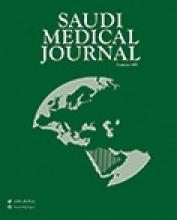Research ArticleOriginal Article
Open Access
Impact of a multidisciplinary intensive education program on type 2 diabetes mellitus patients’ glycemic control and cardiovascular risk factors
Mohamed N. Al-Arifi and Hussain A. Al-Omar
Saudi Medical Journal July 2018, 39 (7) 705-710; DOI: https://doi.org/10.15537/smj.2018.7.22194
Mohamed N. Al-Arifi
From the Department of Clinical Pharmacy, College of Pharmacy, King Saud University, Riyadh, Kingdom of Saudi Arabia
PhDHussain A. Al-Omar
From the Department of Clinical Pharmacy, College of Pharmacy, King Saud University, Riyadh, Kingdom of Saudi Arabia
MSc, PhD
References
- ↵
- Al Dawish MA,
- Robert AA,
- Braham R,
- Al Hayek AA,
- Al Saeed A,
- Ahmed RA,
- et al.
- ↵
- Robert AA,
- Al Dawish MA,
- Braham R,
- Musallam MA,
- Al Hayek AA,
- Al Kahtany NH
- ↵
- ↵
- Al Asmary SM,
- Tourkmani AM,
- Al Khashan HI,
- Al-Qahtani H,
- Mishriky A,
- Bakhiet A,
- et al.
- ↵
- Rushforth B,
- McCrorie C,
- Glidewell L,
- Midgley E,
- Foy R
- ↵
- ↵
- Keers JC,
- Links T,
- Bouma J,
- Scholten-Jaegers S,
- Gans R,
- Sanderman R
- ↵
- ↵
- Funnell MM,
- Brown TL,
- Childs BP,
- Haas LB,
- Hosey GM,
- Jensen B,
- et al.
- ↵
- Gary TL,
- Genkinger JM,
- Guallar E,
- Peyrot M,
- Brancati FL
- ↵
- ↵
- Stratton IM,
- Adler AI,
- Neil HA,
- Matthews DR,
- Manley SE,
- Cull CA,
- et al.
- ↵
- McGill M,
- Blonde L,
- Chan JCN,
- Khunti K,
- Lavalle FJ,
- Bailey CJ
- ↵
- Nelson CA,
- Park CK,
- Gates RJ,
- Arreguin ME,
- Salsa TM,
- Miller HB,
- et al.
- ↵
- ↵
- Ciechanowski P,
- Wagner E,
- Schmaling K,
- Schwartz S,
- Williams B,
- Diehr P,
- et al.
- Maislos M,
- Weisman D
- ↵
- Zwar NA,
- Hermiz O,
- Comino EJ,
- Shortus T,
- Burns J,
- Harris M
- ↵
- ↵
- Grossman A,
- Grossman E
- ↵
- ↵
- ↵
- Babelgaith SD,
- Baidi M,
- Al-Arifi M,
- Alfadly S,
- Wajid S
- ↵
- Schellenberg ES,
- Dryden DM,
- Vandermeer B,
- Ha C,
- Korownyk C
In this issue
Impact of a multidisciplinary intensive education program on type 2 diabetes mellitus patients’ glycemic control and cardiovascular risk factors
Mohamed N. Al-Arifi, Hussain A. Al-Omar
Saudi Medical Journal Jul 2018, 39 (7) 705-710; DOI: 10.15537/smj.2018.7.22194
Jump to section
Related Articles
- No related articles found.





